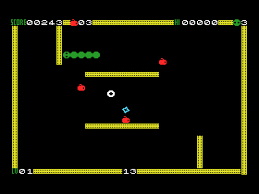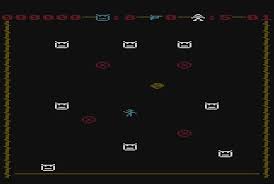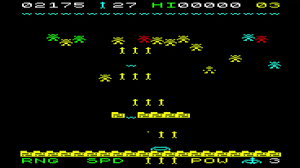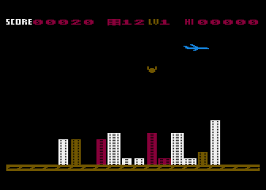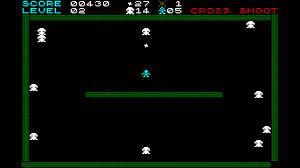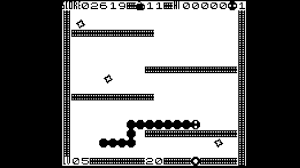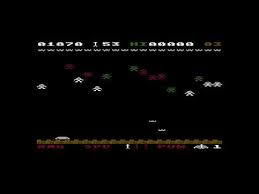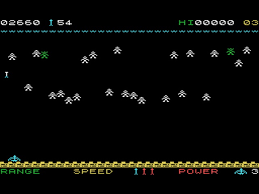Cross-Lib and games that use it (e.g., Cross Chase, Cross Shoot, Cross Bomber, Cross Snake, Cross Horde)
by Fabrizio Caruso (fabrizio_caruso@hotmail.com)
The universal retro-hardware abstraction layer.
Cross-Lib, a retro-hardware abstraction layer for coding "universal" demos, games and programs for hundreds of mostly 8-bit systems (consoles, computers, scientific calculators, hand-held consoles, arcade boards, hacked toy computers, etc.).
These games are the proof of the flexibility of Cross-Lib:
- Cross Chase is compiled for and run on (nearly) ALL 8-bit computers, game consoles, hand-held game consoles and scientific calculators. It can be parametrized in a way to make it run on systems with as little as 3k or 4k of available memory for the code. It is somehow similar to Gnome Robots. The main difference is that it is a real-time game and that it has several items and power-ups to pick.
- Cross Shoot requires more memory than "Cross Chase" but it should be equally universal as long as the required memory is available. It is a shooter somehow similar to Robotron. It has many items and secrets to discover.
- Cross Bomber is a mini-game and clone of Air Attack (aka Blitz). So it requires much less memory than "Cross Chase". Its code is almost entirely in a single file. It uses pre-shifted tiles to produce smoother movements on graphics-enabled targets.
- Cross Snake is similar in size to Cross Chase and can be run on an unexpanded Commodore 16 or a Commodore Vic 20 with +8k memory expansion. It a my personal re-interpretation of Nibbler (arcade game) to which I have added more game elements. It has 50 secrets and several items to discover.
- Cross Horde is similar in size to Cross Chase and can be run on an unexpanded Commodore 16 or a Commodore Vic 20 with +8k memory expansion. It is a zombie shooter with several different enemies, levels, power-ups and special items to pick.
You can play the games online and read more about them in: https://github.com/Fabrizio-Caruso/CROSS-LIB/blob/master/docs/GAMES.md
The main goal is to get the library and game to work on most vintage systems with possibly all 8-bit architectures as well as some 16 and 32-bit architectures. A partial list of the supported systems with their status is in: https://github.com/Fabrizio-Caruso/CROSS-LIB/blob/master/docs/STATUS.md
The most significant supported CPU architecture are described below.
- COSMAC RCA 1802 and derivates
- Intel 8080 and derivatives
- MOS 6502 and derivatives
- Motorola 6809 and derivatives
- Motorola 6803
- Zilog 80 and derivatives
- Intel 8088/8086
- Motorola 68000/68008
- PDP11
- TMS 9900
- Zilog Z8000
- PowerPC
- Intel 386
- Motorola 68020
- MIPS32r2 (little-endian)
We also support any current architecture for which GCC can produce a working binary.
For most vintage systems (more than 200 different systems and sub-systems), you can build a version of the game with some graphics, sounds and real time input. In principle you can compile the game in turn-based mode with minimal input and output (stdlib) for any architecture for which there is an ANSI C capable compiler. You can also compile the game in action mode with minimal input and output for any architecture for which there an ANCI C compiler with ncurses or conio libraries.
For a complete list of the supported systems and their status look at: https://github.com/Fabrizio-Caruso/CROSS-LIB/blob/master/docs/STATUS.md
How is it this done? This is achieved by having "Cross Lib" provide APIs for the game code. The game and library code are separated:
- the game code only depends on the APIs interface and
- the APIs do not depend on the game code. Therefore it must be possible to re-use the same library for other games/programs.
The tool-chain currently supports: CC65, Z88DK (SCCZ80 and ZSDCC), CMOC, LCC1802, ACK, XTC68, GCC, GCC-Z8K, GCC-ATARI-ST, GCC-AMIGA, GCC-TI.
For more details look at: https://github.com/Fabrizio-Caruso/CROSS-LIB/blob/master/docs/COMPILERS.md
In order to compile the game you need to be in a POSIX environment such as Windows+Cygwin, Linux, FreeBSD, MacOS or any Unix-like environment that supports the "make" command.
For more details we refer to: https://github.com/Fabrizio-Caruso/CROSS-LIB/blob/master/docs/PREREQUISITES.md
You can quickly test the native compilation with GCC on the full code of Cross Chase by running
make simple_test
If you want to run multiple tests (based on the code of Cross Chase) you can use:
make no_z88dk_test -> runs tests on few targets excluding the ones that use Z88DK on the full code
make z88dk_test -> runs tests on few targets that use Z88DK on the full code
make test -> runs tests on few targets including the ones that use Z88DK on the full code
make z88dk_quick_test -> runs tests on many targets that only use Z88DK on a sub-set of the code
If you just want to build the game only for a specific system without choosing a specific version, you can build the default target for a given system with
make [system_name] -f Makefile.[game_name]
where current possible game names are chase, shoot, bomber. For Cross Chase you can always omit -f Makefile.chase.
For the list of systems either run make statusor look at
https://github.com/Fabrizio-Caruso/CROSS-LIB/blob/master/docs/STATUS.md
Examples:
make c64 -f Makefile.chase(or equivalentlymake c64) builds the default binary of Cross Chase for Commodore 64.make nes -f Makefile.shootbuilds the default binary of Cross Shoot for the Nintendo NES videogame console.make spectrum -f Makefile.bomberbuilds the default binary of Cross Bomber for the Sinclair ZX Spectrum.make ti83 -f Makefile.chase(or equivalentlymake ti83) builds the default binary of Cross Chase for the Texas Instrument TI 83 scientific calculator.
You can build all targets for a given system with
make [system_name]_targets
These targets currently exist mostly for Cross Chase. So no need to specify -f Makefile.chase.
See the list of the supported systems follow the link above or run make list.
Examples:
make vic20_targetsbuilds all Cross Chase binaries for the Commodore Vic 20.make spectrum_targetsbuilds all Cross Chase binaries for the Sinclair ZX Spectrum.
make [compiler_name]_targets -f Makefile.[game_name]
where current possible game names are chase, shoot, bomber. For Cross Chase you can always omit -f Makefile.chase
You can find the list of compilers and dev-kit if you either run make help or look at
https://github.com/Fabrizio-Caruso/CROSS-LIB/blob/master/docs/COMPILER_NAMES.md
Examples:
make gcc_targets -f Makefile.chase(or equivalentlymake gcc_targets) builds Cross Chase for all targets by using GCC for the native host console (e.g., CYGWIN, Linux, etc. console).make cc65_targetsbuilds Cross Chase for all targets that are built with the CC65 cross-compiler for the MOS 6502-based systems.make cmoc_targetsbuilds Cross Chase for all targets that are built with the CMOC cross-compiler for the Motorola 6809-based systems.make z88dk_targetsbuilds Cross Chase for all targets that are built with the SCCZ80 and ZSDCC cross-compilers of the Z88DK dev-kit for Zilog 80-based and Intel 8080-based systems.make cc65_targets -f Makefile.shootbuilds Cross Shoot for all targets that are built with the CC65 cross-compiler for the MOS 6502-based systems.make z88dk_targets -f Makefile.bomberbuilds Cross Bomber for all targets that are built with the SCCZ80 and ZSDCC cross-compilers of the Z88DK dev-kit for Zilog 80-based and Intel 8080-based systems.make lcc1802_targets -f Makefile.bomberbuilds Cross Bomber for all targets that are built with the LCC1802 cross-compiler for the RCA COSMAC 1802-based systems.
For more details on how to build either run make help or look at
https://github.com/Fabrizio-Caruso/CROSS-LIB/blob/master/docs/BUILD.md
The currently available APIs are described at https://github.com/Fabrizio-Caruso/CROSS-LIB/blob/master/docs/CROSS_LIB_APIS.md
In order to run the game you will have to follow a different procedure depending on whether you want to load it into an emulated system or a real system.
In most cases loading an executable into an emulator is straightforward. For a detailed guide on how to load the game on several emulated systems for which the procedure is not obvious, we refer to: https://github.com/Fabrizio-Caruso/CROSS-LIB/blob/master/docs/HOW_TO_LOAD_THE_GAME.md
This depends on the systems and the format used to store the game. For some hints on this take a look at: https://github.com/Fabrizio-Caruso/CROSS-LIB/blob/master/docs/HOW_TO_LOAD_THE_GAME_ON_REAL_HARDWARE.md
The game code is hardware-agnostic and has to be as portable as possible. Therefore the following coding choices and design decisions have been made:
- ANSI C (for the game logic);
- strictly separated input/output and hardware-dependent code (in Cross-Lib) from the game logic;
- input for keyboard/joystick and output for sound and display are provided by Cross-Lib
Some target(s) may get specific graphic code with re-defined characters, software/hardware sprites and music/sound effects but the game code is hardware-agnostic.
The code of the games is in: https://github.com/Fabrizio-Caruso/CROSS-LIB/tree/master/src/games
The code of some demos is in: https://github.com/Fabrizio-Caruso/CROSS-LIB/tree/master/src/demos
Z80-based targets: https://docs.google.com/spreadsheets/d/1qo2skBUtCUCAac3knEE2x-bUBdvxEA_6qvElacJ3xNY/edit?usp=sharing
The main future goals are
- improving the exposed APIs
- supporting more cross-compilers, native compilers, systems and sub-targets
- adding more features to Cross-Lib (e.g., more redefinable tiles, more sound effects, etc.)
- coding more universal games and demos
The tool-chain and Cross-Lib will produce a game with simple black and white ASCII graphics and no sound if none of these is available. If colors, graphics and sounds are available the tool-chain and Cross-Lib will produce a game with some simple sound effects and with some possibly colored graphics.
For example for the game Cross Snake you can see how it is rendered on the MSX and on the Game Boy:
For more snapshots we refer to: https://github.com/Fabrizio-Caruso/CROSS-LIB/blob/master/docs/SNAPSHOTS.md
Cross-Lib provides a retro-hardware abstraction layer for display, sound, input, etc.
Cross-Lib code is in: https://github.com/Fabrizio-Caruso/CROSS-LIB/tree/master/src/cross_lib
Sound abstraction is achieved by providing common APIs for the (few) sounds that Cross-Lib provides.
Input abstraction is also achieved by common APIs that support either keyboard and/or joystick input for each possible target.
Display abstraction is provided by (at least) two levels of abstraction:
- Common APIs that, for each target, implement one of several graphics modes;
- Generic graphics modes that may be shared among a few targets.
For more details on Cross-Lib we refer to: https://github.com/Fabrizio-Caruso/CROSS-LIB/blob/master/docs/CROSSLIB.md
Cross-Lib would not exist without the cross-compilers and the support of their developers and the support of some people who have helped me handle the input/output of some targets.
A partial list of the people who have helped in found in: https://github.com/Fabrizio-Caruso/CROSS-LIB/blob/master/docs/CREDITS.txt
This software is provided 'as-is', without any express or implied warranty. In no event will the authors be held liable for any damages arising from the use of this software.
Permission is granted to anyone to use this software for non-commercial applications, subject to the following restrictions:
-
The origin of this software must not be misrepresented; you must not claim that you wrote the original software. If you use this software in a product, an acknowledgment in the product documentation would be appreciated but is not required.
-
Altered source versions must be plainly marked as such, and must not be misrepresented as being the original software.
-
This notice may not be removed or altered from any source distribution.
